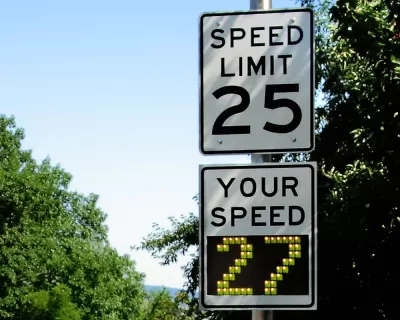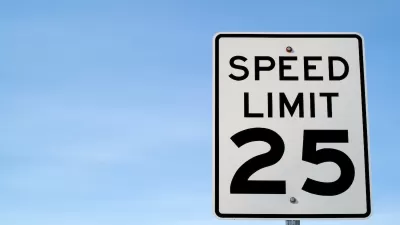Lower speed limits make cities safer, more livable, and, in the long run, more functional.

"The case for a fundamentally slower city has gained traction recently, especially in places where the rise of micromobility, the promise of autonomous vehicles, and the very-much-already-here problem of road congestion have converged, slowing drivers to a furious crawl," writes Andrew Small.
In the past, traffic jams were considered part of urban life, says Small, but drivers began to see speed as a right as cities changed and roads widened. Lately, however, a number of American cities have been moving back to lower speed limits, in response to both safety concerns and the diversifying of the mobility landscape.
"The most obvious immediate benefit to a fundamentally slower city is the safety boost it delivers. Reducing speeds is the best, easiest, and fastest way to quickly radically improve safety, for both drivers and anyone in front of them," says Small.
Technology, and the new modes that it has made possible, is also encouraging slower cities:
The micromobility revolution not only highlights a burgeoning need for more slow lanes: It can vividly illustrate the people-moving power of very modest speeds. When a dude on an electric scooter that rarely goes over 10 mph handily beats a BMW across town at rush hour, it’s easier to see how the scale of cities supports more-but-slower vehicles.
In addition, autonomous vehicles could help usher in a new era of slower-moving city streets. "If we can reconceptualize autonomous vehicles as low-speed machines trundling around downtown rather than interstate-eating robots tasked with making complex split-second driving decisions at highway velocities, everything gets less difficult," notes Small.
FULL STORY: Why Speed Kills Cities

Alabama: Trump Terminates Settlements for Black Communities Harmed By Raw Sewage
Trump deemed the landmark civil rights agreement “illegal DEI and environmental justice policy.”

Study: Maui’s Plan to Convert Vacation Rentals to Long-Term Housing Could Cause Nearly $1 Billion Economic Loss
The plan would reduce visitor accommodation by 25% resulting in 1,900 jobs lost.

Planetizen Federal Action Tracker
A weekly monitor of how Trump’s orders and actions are impacting planners and planning in America.

Grand Rapids Mayor Proposes Garage Conversion Plan
The mayor says allowing homeowners to convert garages to dwelling units could alleviate the city’s housing shortage.

Baltimore Ordered to Improve Sidewalk Accessibility
The city is one of many to face lawsuits for failing to comply with the Americans with Disabilities Act.

This Toronto Suburb Has More Bus Riders Than Columbus, Ohio
Brampton, Ontario used gradual improvements in service to prove that if you build it, they will ride.
Urban Design for Planners 1: Software Tools
This six-course series explores essential urban design concepts using open source software and equips planners with the tools they need to participate fully in the urban design process.
Planning for Universal Design
Learn the tools for implementing Universal Design in planning regulations.
Smith Gee Studio
Alamo Area Metropolitan Planning Organization
City of Santa Clarita
Institute for Housing and Urban Development Studies (IHS)
City of Grandview
Harvard GSD Executive Education
Toledo-Lucas County Plan Commissions
Salt Lake City
NYU Wagner Graduate School of Public Service





























